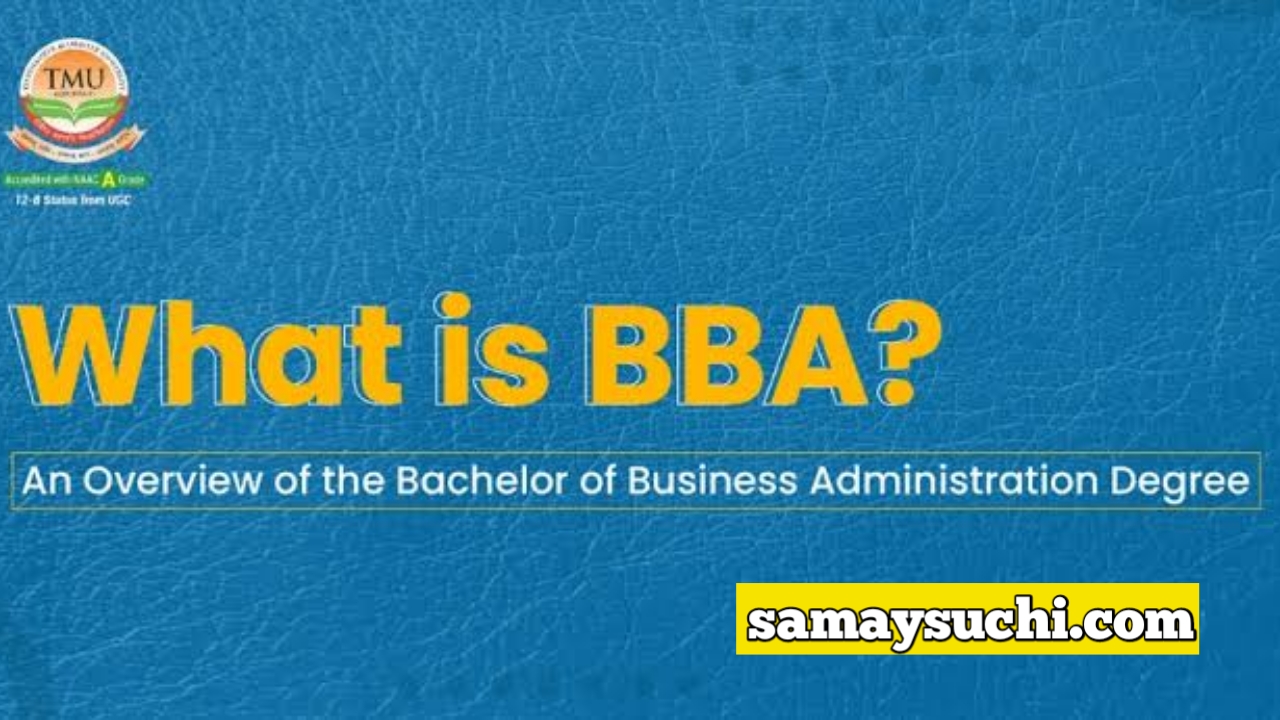What is BBA? An Overview of the Bachelor of Business Administration Degree

BBA (Bachelor of Business Administration)
BBA is a 3-year undergraduate program focused on business management and administration.
It covers key subjects like marketing, finance, and human resources, with specialization options in areas such as international business and digital marketing.
Eligibility requires completing 12th grade with a minimum aggregate score. Admission may involve entrance exams and interviews.
BBA graduates can pursue careers in various sectors, including marketing, finance, and human resources, or continue with higher education like an MBA for better career opportunities.
Read also: Innovative Teaching Methods in Higher Education: Flipped Classrooms, and More
What Does a BBA Stand For?
BBA stands for Bachelor of Business Administration, a comprehensive program that covers various aspects of managing a business, from accounting and marketing to human resources and operations.
This degree equips students with a broad understanding of business principles and prepares them for real-world challenges in the corporate environment.
Importance of a BBA Degree
In today’s globalized world, businesses are the backbone of the economy, and a BBA degree is crucial for those looking to step into this dynamic sector.
Whether you aim to work in large corporations or start your venture, a BBA equips you with the knowledge and skills needed to succeed.
Key Features of a BBA Program
A BBA program covers a range of subjects that touch on various facets of business and management. From leadership development to financial management, this degree is designed to create well-rounded business professionals.
Core Subjects in a BBA Program
A Bachelor of Business Administration (BBA) program typically covers a wide range of business-related subjects. Here are some of the core subjects commonly included in BBA programs:
| Subject | Description |
|---|---|
| Business Administration | Fundamentals of business management, organization structure, and operations. |
| Accounting | Financial accounting, managerial accounting, cost accounting, and taxation. |
| Marketing | Market research, consumer behavior, advertising, and sales management. |
| Finance | Financial management, corporate finance, investments, and risk management. |
| Human Resource Management | Organizational behavior, recruitment, training, and employee relations. |
| Economics | Microeconomics and macroeconomics, analyzing economic systems and markets. |
| Management Information Systems (MIS) | Computer applications in business, database management, and information systems. |
| Operations Management | Production planning, quality control, and supply chain management. |
| Business Law | Legal aspects of business, contract law, and business ethics. |
This is just a general overview, and the specific subjects covered in a BBA program may vary depending on the institution and specialization. Some BBA programs may also offer specialized courses in areas such as entrepreneurship, international business, or e-commerce.
Specializations Available in BBA
Many universities offer specializations that allow students to focus on a specific area of business. Some popular specializations include:
- Marketing
- Finance
- Human Resources
- International Business
- Information Technology
Eligibility Criteria for BBA
To enroll in a BBA program, most institutions require students to have completed their higher secondary education (12th grade) with a minimum aggregate score. Some colleges may also conduct entrance exams or interviews as part of their selection process.
Duration and Structure of the BBA Program
The BBA program typically spans three years and is divided into six semesters. The course structure is designed to build a foundation in the first year, introduce advanced concepts in the second, and allow for practical exposure in the final year through internships and projects.
Skills Acquired During a BBA Program
A Bachelor of Business Administration (BBA) program equips students with a wide range of valuable skills that are essential for success in the business world. Here are some of the key skills acquired during a BBA program:
| Skill | Description |
|---|---|
| Problem-solving | Ability to analyze complex problems and find effective solutions. |
| Decision-making | Ability to make informed and rational decisions. |
| Leadership | Ability to inspire and motivate others, and take charge of projects. |
| Communication | Effective written and verbal communication skills. |
| Teamwork | Ability to collaborate effectively with others and work in teams. |
| Time management | Ability to manage time efficiently and prioritize tasks. |
| Adaptability | Ability to adapt to changing circumstances and new challenges. |
| Critical thinking | Ability to analyze information, evaluate arguments, and conclude. |
| Negotiation | Ability to negotiate effectively and reach mutually beneficial agreements. |
| Presentation skills | Ability to present information clearly and confidently. |
These skills are highly transferable and can be applied to a variety of career paths, making BBA graduates valuable assets in the business world.
BBA vs. Other Business Degrees
BBA is often compared to other business degrees like B.Com and BBM. While B.Com focuses more on commerce and financial subjects, BBA offers a broader view of business management. BBM, on the other hand, is similar to BBA but may differ in its approach and curriculum.
Why Choose BBA as a Career Path?
Choosing a BBA can open doors to various career opportunities. It provides a solid grounding in business, allowing students to either enter the job market or pursue higher studies. The practical approach of the BBA curriculum makes it ideal for students who are looking for hands-on experience in business management.
Career Options after BBA
One of the biggest advantages of a BBA degree is the diversity of career options available after graduation. Let’s explore some of them:
Corporate Job Roles for BBA Graduates
BBA graduates can find positions in various departments within an organization. Some popular job roles include:
- Business Analyst
- Marketing Manager
- Human Resources Executive
- Financial Analyst
- Operations Manager
Entrepreneurial Opportunities
For those with an entrepreneurial mindset, a BBA can provide the tools and knowledge necessary to start your own business. With a strong understanding of business operations and management, you’ll have the confidence to pursue your business ventures.
Higher Education Options After BBA
After completing a BBA, many students opt to pursue higher education:
- MBA (Master of Business Administration)
- M.Com (Master of Commerce)
- PGDM (Post Graduate Diploma in Management)
These advanced degrees further sharpen their business skills and improve career prospects.
Top Colleges for BBA in India
India has several prestigious institutions that offer BBA programs. Some of the top colleges include:
- Indian Institute of Management (IIM), Indore
- Shaheed Sukhdev College of Business Studies, Delhi University
- Christ University, Bangalore
- Symbiosis International University, Pune
How to Choose the Right BBA College
When selecting a college for BBA, consider factors such as:
- Accreditation: Ensure the college is accredited by relevant authorities.
- Faculty: Check the qualifications and experience of the teaching staff.
- Placements: Review the college’s placement history and ties with industries.
- Infrastructure: Evaluate the facilities, libraries, and technology support.
Challenges Faced During a BBA Course
While BBA is an exciting degree, it also comes with challenges. These include balancing practical and theoretical learning, keeping up with industry trends, and managing the pressure of internships and projects. However, overcoming these challenges can lead to great rewards in the business world.
Conclusion
In conclusion, a BBA degree is a solid choice for anyone looking to enter the field of business management. It offers a blend of practical and theoretical knowledge, equipping students with the skills required to thrive in the corporate world. Whether you’re aiming for a career in management or entrepreneurship, a BBA can set you on the path to success.
FAQs
Q1: Is BBA a good option for a career in business?
Ans: Yes, BBA is an excellent option for those interested in business management. It provides a strong foundation in business principles and offers numerous career opportunities.
Q2: Can I pursue BBA after science stream?
Ans: Yes, students from any stream (science, commerce, or arts) can pursue a BBA, provided they meet the eligibility criteria of their chosen institution.
Q3: What are the job prospects after BBA?
Ans: Job prospects for BBA graduates are vast. Graduates can work in marketing, finance, human resources, operations, and more, depending on their specialization.
Q4: Is BBA only about business management?
Ans: While business management is a core focus, a BBA also covers other areas such as economics, finance, and marketing, offering a well-rounded education in business.
Q5: What is the average salary after completing BBA?
Ans: The average starting salary for BBA graduates in India ranges from INR 3 to 6 lakhs per annum, depending on the industry and the individual’s skills.



